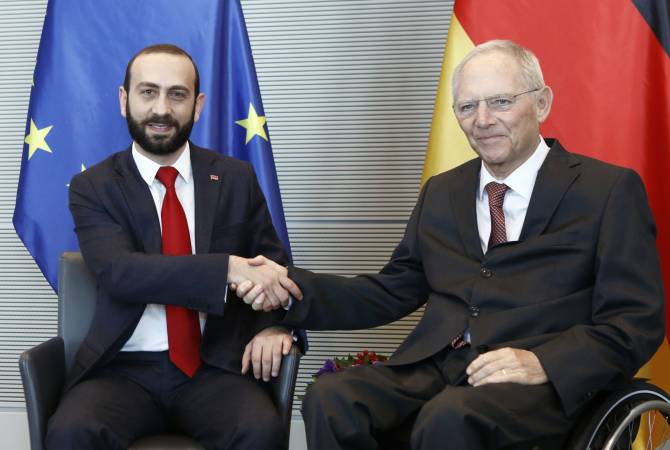BERLIN — Following Prime Minister Nikol Pashinyan’s recent state visit to Germany, the process of intensifying contacts between Yerevan and Berlin continues apace. On the invitation of German Federal President Frank-Walter Steinmeier, the President of the Armenian Parliament Ararat Mirzoyan began a five-day visit to Germany on March 17. In the capital he was received by the President of the Bundestag (Parliament) Wolfgang Schäuble, and was scheduled to meet with parliamentarians, including Petra Pau, Bundestag Vice-President, and Johannes Kars, head of the German-South Caucasus Friendship Group.
His agenda includes discussions with Ralf Wieland, President of the Berlin parliament, Stephan Toscani, President of the Saarland federal state parliament and Parliamentarian Albert Weiler, President of the German-Armenian Forum. The delegation, comprising parliamentarians Ruben Rubinyan, Lilit Makunts, Ednon Marukyan, Naira Zohrabyan and Tsovinar Vardanyan, was invited to visit the German Parliamentary Association (DPG) the German Institute for International and Security Affairs (SWP) and the Saarland University.
Two Peaceful Revolutions
In remarks on March 18 in the Berlin Parliament, Mirzoyan recalled the image still fresh in many Germans’ memories of “the Berlin Wall dividing the people, the country and your beloved city from each other.” He went on to evoke the events of November 9, 1989 when “the people of Germany united” around the idea of an undivided nation, which led to the collapse of the regime in East Germany, and “resulted in the re-unification of Germany on October 3, 1990, which opened a new page in the world history. The world is glad to see again a united and dynamic Germany.” He referred to a picture in the ‘Berlin Wall’ Museum, which shows a woman leaning against the wall, with the caption, “The pressure that in 1987 I made with the palm of my hand produced its result after two years.”
Turning to his own experience, Mirzoyan said, “The struggle of the citizens of the Republic of Armenia through many years for democracy in our country, protection of human rights and the rule of law resulted in the Velvet, non-violent Revolution in April-May, 2018, which unfolded completely in accordance with the Constitution. Now,” he continued, “we should strengthen the democratic model of development and develop its efficiency. In this respect we consider important the deepening of our relations with the EU.”
Working with Europe








